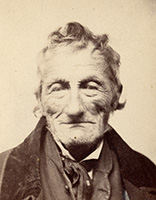
Ebenezer Hubbard
Concord Journal, October 4, 1956
[Ebenezer Hubbard], a farmer who inherited land in this village on which the British troops committed depredation, and who had a deep interest in the history of the raid, erected, many years ago, a flagstaff on his ground, and never neglected to hoist the stars and stripes on the Nineteenth of April, and the Fourth of July. It grieved him deeply that the monument, erected by the town in 1836, should have been built on the ground on which the enemy stood in the Concord Fight instead of on that which the Americans occupied; and he bequeathed in his will one thousand dollars to the town of Concord, on condition that the monument should be erected on the identical ground occupied by our minute-men and militia on that day; and an additional sum of six hundred dollars, on the condition that the town should build a foot-bridge across the river, on the site where the old bridge stood in 1775. The late Mr. Stedman Buttrick having given a necessary piece of land on the other side of the river, the town accepted the legacy of Mr. Hubbard, built the bridge, and employed Daniel Chester French to prepare a statue to be erected on the specified spot.
From Mr. Emerson’s address, April 19, 1875
A more colorful account is given by Judge John S. Keyes in the Concord section of The History of Middlesex County:
Some feeling had always existed among the older citizens that the monument of 1836 stood on the wrong side of the river. This feeling was specially cherished by Ebenezer Hubbard who led the solitary life of a bachelor on his farm in the middle of town. He had accumulated by the frugal ways of an odd recluse some money. He left by his will $1000 to the town for a monument and, “if it is not built within 5 years of my decease then the sum to be paid over to Hancock, N.H.”
Some years after that time for redeeming them had expired; he found six one hundred dollar bills of the Concord Bank in an old family Bible. The president of the bank agreed to redeem them tho not really obliged to do so, and Mr. Hubbard gave the money to him toward rebuilding the bridge. Stedman Buttrick gave the land. Reuben Rice, a leading citizen, gave an additional sum to have two picturesque summer houses on the bridge in keeping with the taste of the day.